Nigeria
2 Chapter Investment Environment
-
-
1 Chapter Basic knowledge
1.2 Political regime and history of Nigeria
1.3 Education and education system in Nigeria
2 Chapter Investment Environment
3 Chapter Economic Environment
3.1 Nigerian economy continuing high growth
3.2 Key political, economic and social stability
3.3 Issues of the Nigerian economy dependent on oil
3.4 Nigerian economy seeking dependence on oil removal
4 Chapter Corporate Law
5 Chapter Tax Law
-
-
-
Investment environment in Nigeria ~ Looking from the questionnaire ~
Current status of business environment from 2013 (questionnaire)
In October 2012, the World Bank and the International Finance Corporation (IFC) jointly announced the "Current Business Environment 2013". From this questionnaire we will look at Nigeria's assessment of the world. Nigeria is ranked 131 in this ranking overall ranking in 183 countries and regions (133th in 2012) and it is ranked worldwide. There are also other countries where economic development is expected in Africa such as South Africa (39th place), Ghana (64th place), Tunisia (50th place), Egypt (109th place), Mexico (48th place) called next, it is in a lower rank than Turkey (71th), Indonesia (128th) etc.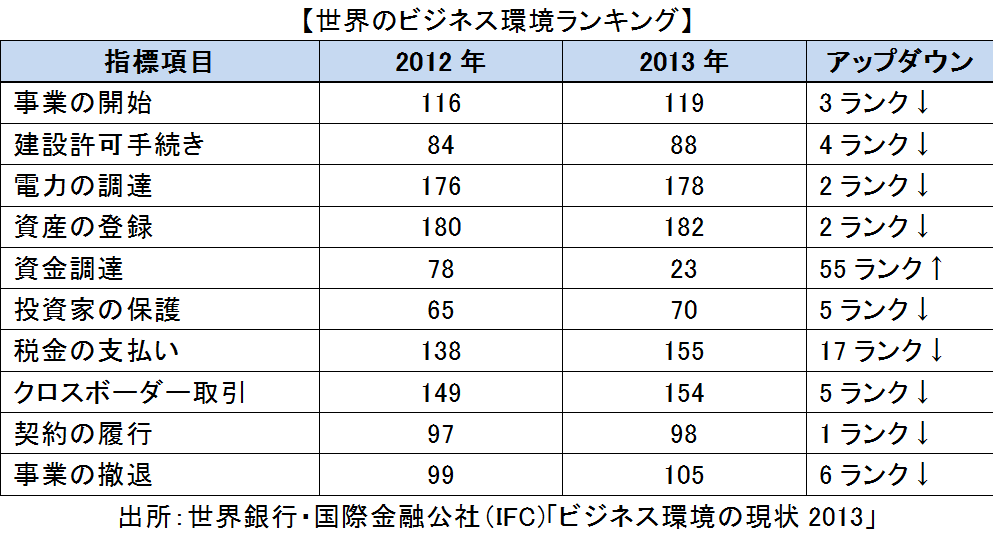
In the ranking of 2013, the items that Nigeria ranked higher than the overall ranking are "fund procurement" "investor protection" "construction permission procedure" "contract execution" "business withdrawal" "start of business".
-
Financial (stock) market
There are two stock exchanges in Nigeria, one is the Nigerian Stock Exchange (NSE) in Lagos, the central city of the Nigerian economy, and the other is the Abuja Stock Exchange, the capital of Abuja (ASCE: Abuja Securities and Commodities Exchange).
The NSE was founded in 1960 as the Lagos Stock Exchange, after which it will be renamed to the present. In the sub-Saharan Africa, it is the second largest after the Johannesburg Stock Exchange in South Africa, with market capitalization of US $ 51.2 billion and number of listed companies 257 (as of 2011). Foreigners can freely invest by deregulation. Also, in 2011, I became talked about Aliko Dangote, one of Africa's leading asset owner, taking over as NSE president. The stock price index includes NSE All Stock Index for all stocks and NSE 30 with specific stocks.
In ASCE, commodity futures trading such as corn and cassava, mainly cereals, etc. are carried out.【Trend of Nigerian Stock Exchange Stock Price (NGSEINDX)】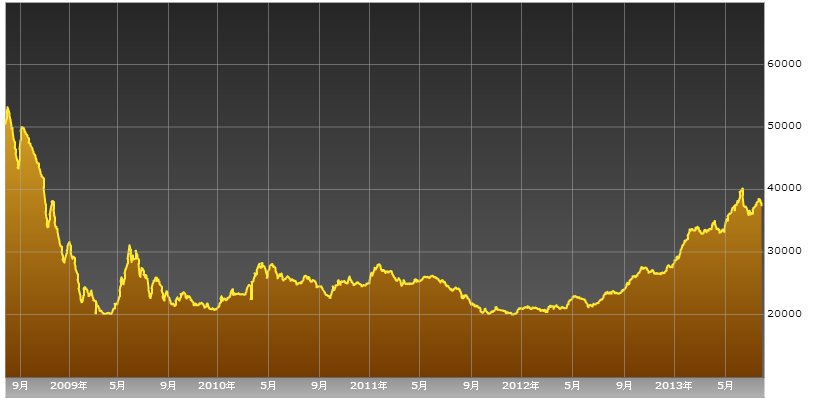
※ NGSEINDX is the Nigerian Stock Exchange's All Stock Index
-
Exchange rate
In November 2008, the Nigerian currency Naira greatly reduced its value against major currencies such as against the US dollar, against the euro, against the yen against the influence of the global financial crisis. The value we wanted to keep on about 120 naira against the US dollar sharply dropped to about 150 naira. After that, although it is in a state of Naira depreciation compared to before the global financial crisis, it is getting a little restless.
As a feature of Nigerian currency exchange, there is accumulation of foreign currency that we have acquired through oil export. Nigerian foreign exchange reserves amount to US $ 46.4 billion in 2012, which is virtually a power to maintain the peg system, making foreign exchange relatively stable. Also, in 2012, the government announced that it will make some of the reserves of foreign reserves a Chinese renminbi. Although we continue to make the Euro and other European currencies mainly as US dollar as the main reserves, it can be said that this is a new move in anticipation of the influence of China in the future.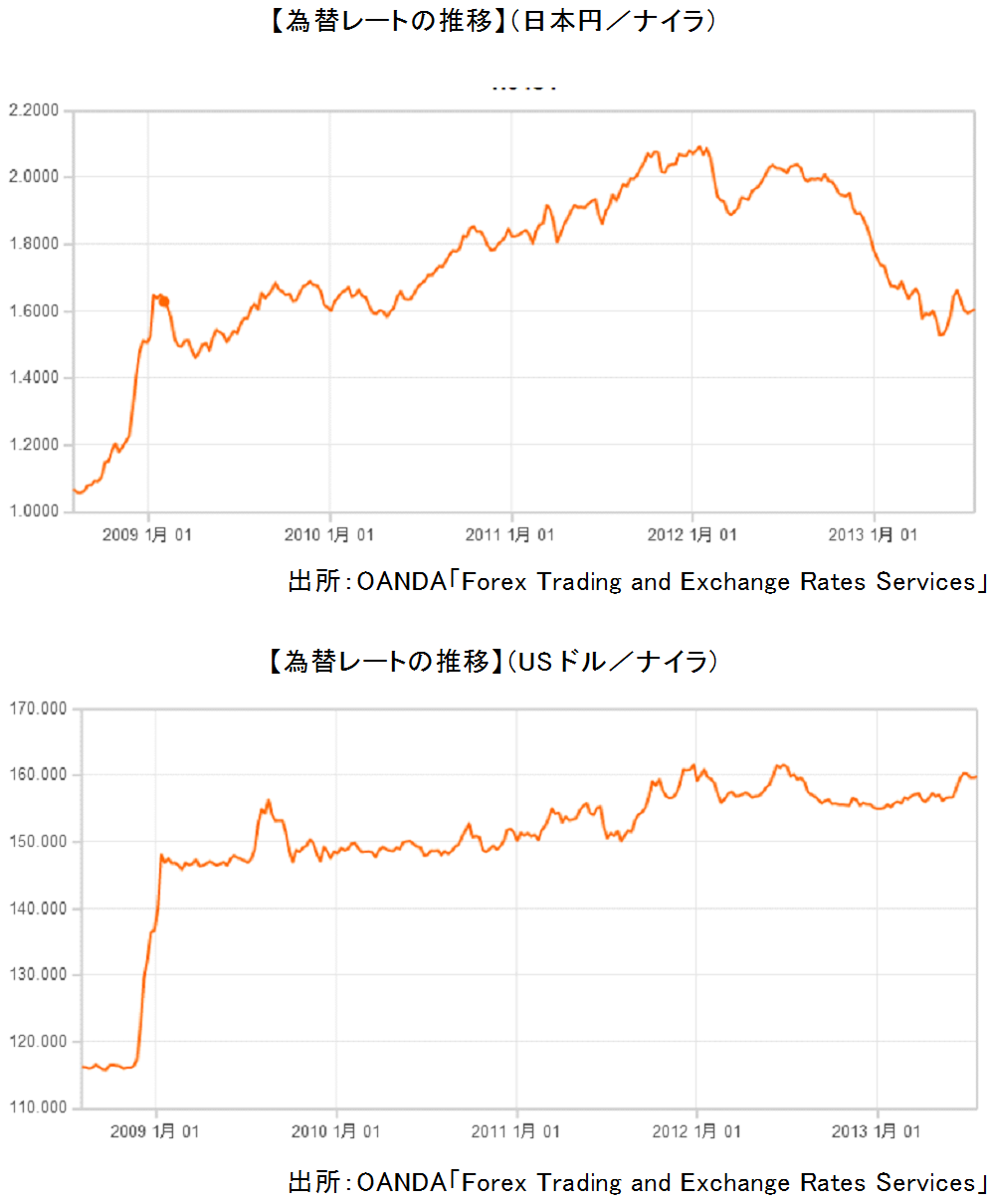
-
Foreign direct investment amount (FDI)
Foreign direct investment in Nigeria is the second biggest in Africa after South Africa, especially in the past decade. The acceptance amount for 2011 is 7.9 billion dollars, it is the 19th place in the world.Looking at the amount of foreign direct investment by country, you can see that the UK, the United States, the Netherlands, etc. with major oils are top positions. It is also characterized by a large number of investments from European countries that are deeply connected historically, including France.Although the amount of money is still small, investment from China, South Korea and Japan is also increasing, and you can see that it gathers worldwide attention. For China, Nigeria is positioned as the largest investment destination in Africa and will be attracting more attention including future energy competition.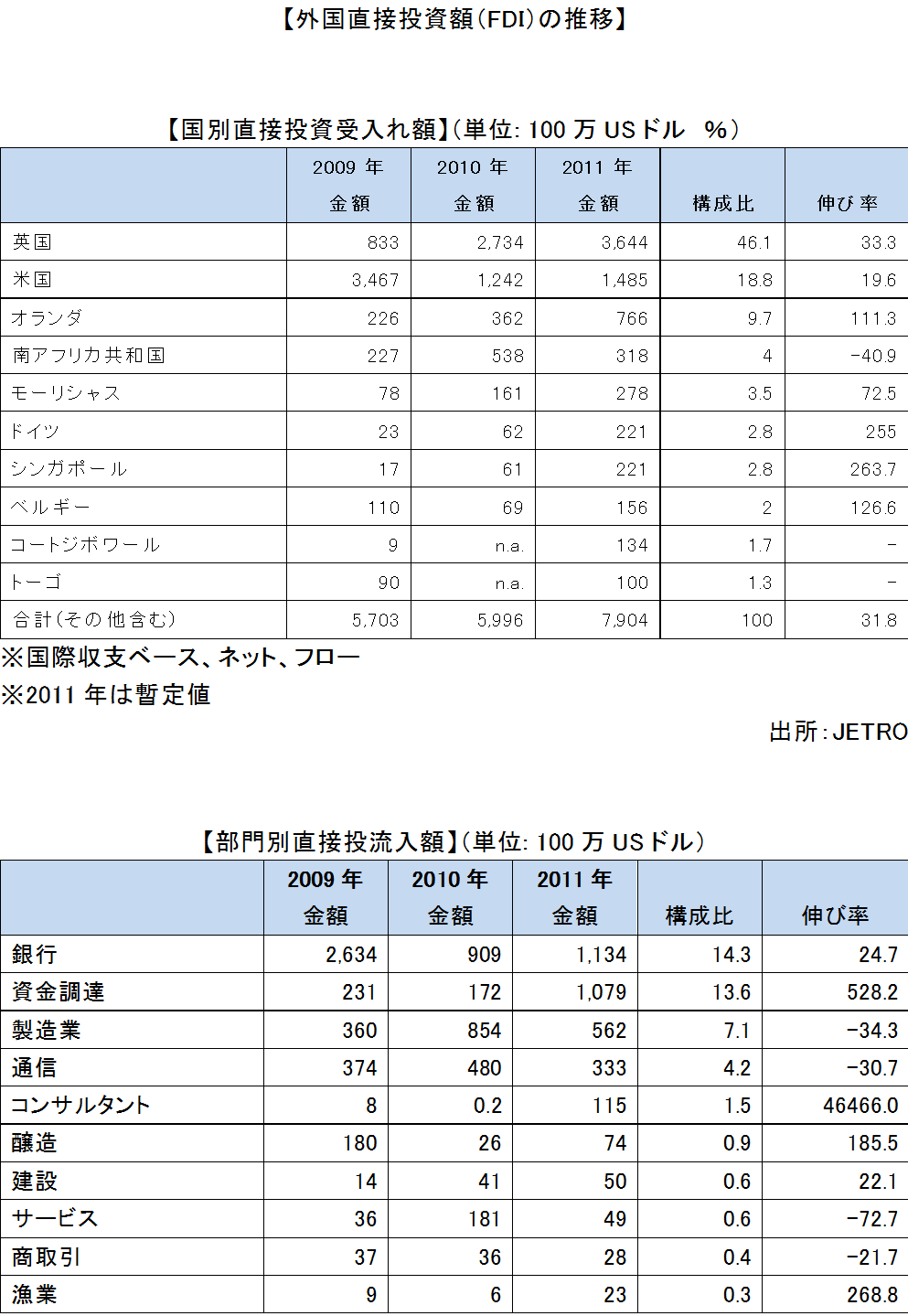
-
Infrastructure
According to the World Economic Forum's "The Global Competitiveness Report 2012-2013", the comprehensive evaluation of Nigerian infrastructure is 117 out of 144 countries. It is in a condition of being largely drained compared with African countries such as Morocco 52th, South Africa 48th, Kenya 80th, Ghana 86th and Egypt 88th. Infrastructure evaluation of Nigeria is located in lower group among Africa.Evaluation of each infrastructure is 114th in the road, 95th in the railroad, 106th in the port, 100th in the airport, 138th in the electricity, 135th in the fixed telephone and 124th in the mobile phone.■ RailwayIn Nigeria there are three major railway lines connecting major regions / cities. One is the route connecting Nigeria’s largest city Lagos and the northern central city of Kano, and the other line is a line connecting Port-Harcourt, a port city in the southeast, to Maiduguri in the northeast, these two are colonies It was developed in the era. The third line is the route connecting Ajaokuta and Itakpe which was newly established after the colonial era. Both are managed by the Nigerian Railway Corporation (NRC), the total extended distance is 3,528 km (2000).
The Nigerian railway functioned as a major transportation agency during the colonial era, but as the government has taken over the car transportation taking advantage of the characteristics of Nigeria, which can provide gasoline at low cost as an oil producing country, the car transportation has occupied the majority of the current land transport.
The NRC has a chronic deficit and the maintenance of the railway line has been stalled over a long period of time. In recent years, maintenance has gradually been carried out, but it is not yet a state that can be said to be the main transportation agency. For passengers, for example, the train connecting Lagos and Kano, which is the main route, is only one round trip per week, other routes are equal or less. Also, there are things that the railway does not pass through Abuja in the current capital, and there are no international routes with neighboring countries beyond the borders, so it is not yet said that both cargo and passenger presence exist as a means of transport.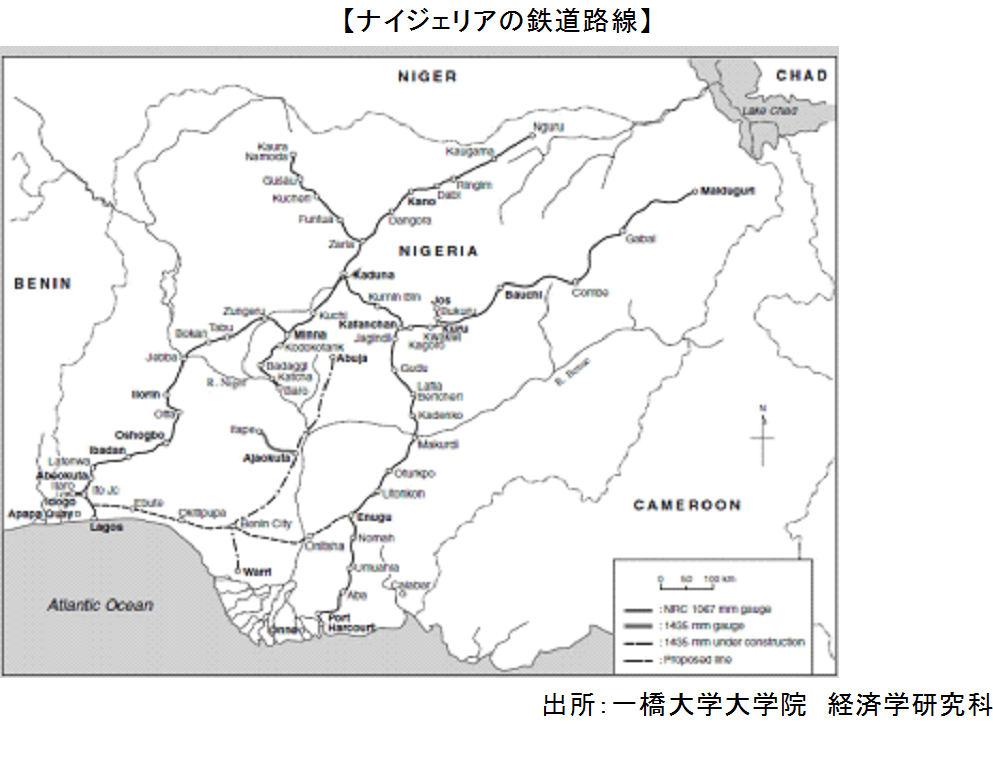
■ PortLagos, the largest city in Nigeria, was originally a Port town opened by Portugal, after that, during the British colonial period, a railroad line to the northern Cano was created, prospering as a trade port.It is the largest port in the country where cargo of the majority of Nigeria is still handled. Container handling volume is 587,600 TEU (2006), following Africa's Durban and Cape Town in South Africa, it is one of Africa's major ports. It is also an indispensable harbor for shipping in West Africa with Abidjan of Cote d 'Ivoire and Tema & Takoradi of Ghana. It mainly consists of Lagos Port, Apapa Port and Tin Kang Port, and a lot of cargo is imported from consumer goods such as foodstuffs to machinery and cars, and crude oil, wood, cacao etc are exported.Also located in the processing of the Bonnie River in the southeastern part of Nigeria Port · Ha Court is a port town that flourished in the first half of the 20th century as a shipping port of coal during the British colonial era. Now that the export item has changed for petroleum, it handles only a part of cargo, and the container handling volume is as small as 5,000 TEU (2006).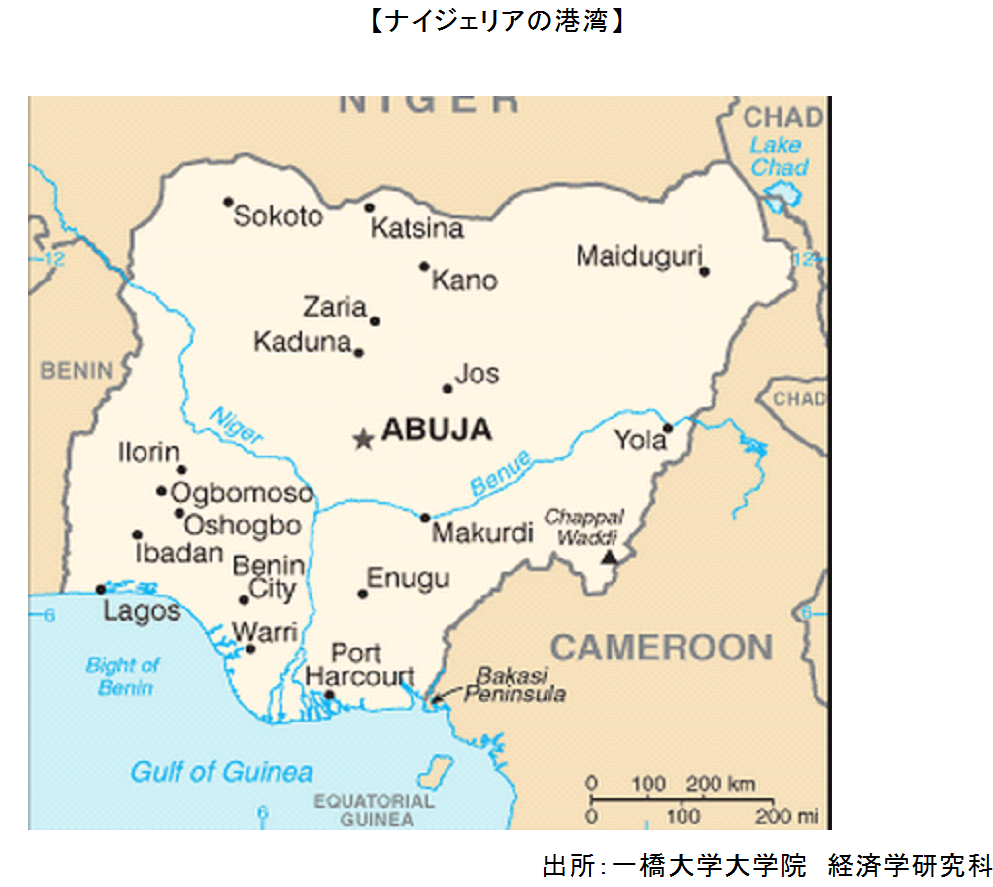 Airport
AirportThere are six international airports in Nigeria. It is Murtala Mohammed International Airport in Lagos and Nnamdi Azikiwe International Airport in the capital Abuja. Also in the north are Malam · Amine · Kano International Airport in the center of Kano, Sadiq · Abu Bakar Ⅲ International Airport in Sokoto, Maiduguri International Airport, Port Ha Court, the center of the southeast, There is Court International Airport.
Murtala · Mohammed International Airport of Lagos is the largest airport, and many international routes are in service. It is also the hub airport of Arik Air, the largest airline in Nigeria. The number of passengers at Murtala-Mohammed International Airport was about 3 million in 2000, but it increases year by year and has doubled to 6.22 million in 2010.
There are more than 10 civilian airlines in Nigeria, some companies have succeeded by new entry like Arik Air and have established a position of top market share, but Air Nigeria, formerly a national flag, Some companies were obliged to withdraw due to manga management like Nigeria · Air).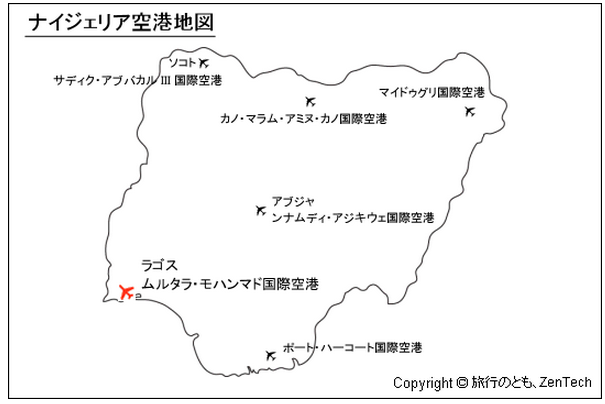 Source: Zen TechA roadThe center of transportation in Nigeria is automobile transportation, and it is said that more than 90% of domestic cargoes and passengers are transported by automobile transportation. The total length of the road has reached 193,200 km (2006), covering a wide area of the country about 2.5 times the size of the country. This is the longest total road extension in Africa, the 23rd longest in the world.However, due to the low pavement rate, we have been faced with issues such as insufficient maintenance of paved roads. So in 2002 the Government of Nigeria founded the Federal Road Maintenance Agency (FERMA) to maintain road maintenance on an ongoing basis and points out securing of independent resources and operational issues There are voices, but road maintenance has been implemented more than before.Also, traffic congestion in large cities such as Lagos is very serious. The road is full of cars and trucks, innumerable buses and small buses that are called innovation. In order to promote the improvement of public transport which is indispensable for improving this situation, Lagos City Transportation Bureau (LAMATA) was established in 2002, and in 2010 "Lagos City Transportation Project" was launched as a public-private joint project. It is said that certain effects have been raised due to orderly and efficient operation of buses operated in disorder and thorough implementation of right-hand traffic. Still, there are also opinions that traffic congestion is increasingly serious, further improvement is urgently needed.PowerAlthough Nigeria is an oil producing country, electricity supply is scarce. In urban areas such as Lagos and Abuja, electrification is progressing rapidly, and the electricity consumption is rapidly increasing with economic growth. However, due to lack of power supply and instability, power outages are a daily routine, and there are many situations where electricity can be used only for several hours a day. Therefore, it is said that the citizens often use in-house generators in common. In addition, the electrification rate in rural areas is about 35% (2000), although it is higher than many African countries, so there are many non-electrified areas that use firewood as fuel.In Nigeria there are 11 thermal power stations and 3 hydroelectric power plants, totaling 13 plants. The total power generation capacity is 4,914 MW, and the real power generation amount is 3,194 MW. In the first place, the power generation capacity itself is only a few tenths of that of South Africa, demand growth has been increasing over the past few years, the demand-supply balance has become tight and frequent power outages occur. In addition, due to the low availability of power plants, we are further exacerbating the supply-demand balance.In order to overcome these problems, the Nigerian government has been trying to implement reform measures many times in the past, but there were few improvements in the amount of power generation due to various factors. Therefore, President Jonathan, elected by the 2010 election, has launched a policy to privatize state-owned power generation and distribution companies. After that, it is said that there are many obstacles to the plan, such as persistent move against opposition to privatization and the minister of power resigned due to vested interests due to corruption, and it is said that there are many obstacles to the plan, and it is said that the uncertain part is big in the outlook.
Source: Zen TechA roadThe center of transportation in Nigeria is automobile transportation, and it is said that more than 90% of domestic cargoes and passengers are transported by automobile transportation. The total length of the road has reached 193,200 km (2006), covering a wide area of the country about 2.5 times the size of the country. This is the longest total road extension in Africa, the 23rd longest in the world.However, due to the low pavement rate, we have been faced with issues such as insufficient maintenance of paved roads. So in 2002 the Government of Nigeria founded the Federal Road Maintenance Agency (FERMA) to maintain road maintenance on an ongoing basis and points out securing of independent resources and operational issues There are voices, but road maintenance has been implemented more than before.Also, traffic congestion in large cities such as Lagos is very serious. The road is full of cars and trucks, innumerable buses and small buses that are called innovation. In order to promote the improvement of public transport which is indispensable for improving this situation, Lagos City Transportation Bureau (LAMATA) was established in 2002, and in 2010 "Lagos City Transportation Project" was launched as a public-private joint project. It is said that certain effects have been raised due to orderly and efficient operation of buses operated in disorder and thorough implementation of right-hand traffic. Still, there are also opinions that traffic congestion is increasingly serious, further improvement is urgently needed.PowerAlthough Nigeria is an oil producing country, electricity supply is scarce. In urban areas such as Lagos and Abuja, electrification is progressing rapidly, and the electricity consumption is rapidly increasing with economic growth. However, due to lack of power supply and instability, power outages are a daily routine, and there are many situations where electricity can be used only for several hours a day. Therefore, it is said that the citizens often use in-house generators in common. In addition, the electrification rate in rural areas is about 35% (2000), although it is higher than many African countries, so there are many non-electrified areas that use firewood as fuel.In Nigeria there are 11 thermal power stations and 3 hydroelectric power plants, totaling 13 plants. The total power generation capacity is 4,914 MW, and the real power generation amount is 3,194 MW. In the first place, the power generation capacity itself is only a few tenths of that of South Africa, demand growth has been increasing over the past few years, the demand-supply balance has become tight and frequent power outages occur. In addition, due to the low availability of power plants, we are further exacerbating the supply-demand balance.In order to overcome these problems, the Nigerian government has been trying to implement reform measures many times in the past, but there were few improvements in the amount of power generation due to various factors. Therefore, President Jonathan, elected by the 2010 election, has launched a policy to privatize state-owned power generation and distribution companies. After that, it is said that there are many obstacles to the plan, such as persistent move against opposition to privatization and the minister of power resigned due to vested interests due to corruption, and it is said that there are many obstacles to the plan, and it is said that the uncertain part is big in the outlook.
■ Water supplyIn Sub - Saharan, the areas where the water supply is complete are limited. In Nigeria as well, about 63% use well water, about 22% use water such as ponds and puddles, the penetration rate of water supply is only about 5% in 2008. Moreover, this percentage has declined every year, 12% in 1999 was 8% in 2003, to 5% in 2008. The water supply improvement is not in time for the population increase.
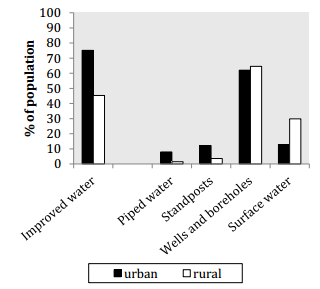
Communication
The number of fixed phone registrations turned to a peak of about 1.68 million in 2007, and in 2012 about 410,000, the penetration rate was only 0.25%. On the other hand, the number of cellular phone registrations has exploded. In 2000, the number of registrations was only 30,000, but exceeded 1 million in 2002, over 10 million in 2005, and over 100 million in 2012. The number of registrations in 2012 is 127.77 million cases, the number of which is the largest in South Africa in Africa. Moreover, since the penetration rate as of 2012 is 67.7%, it is thought that it will further increase in future. Seven companies, including state-owned Globacom South Africa capital MTN Nigeria, Indian capital Airtel Nigeria, and American capital Etisalat Nigeria, have entered the mobile phone service, and in 2011 some LTE services were also launched. In addition, although the penetration rate of the Internet in individuals was only 0.1% in 2000, this is also rapidly spreading, and it is 32.9% in 2012.
.png) Source: ITU (International Telecommunication Union)
Source: ITU (International Telecommunication Union).png) Source: ITU (International Telecommunication Union)
Source: ITU (International Telecommunication Union)
-
-
-
References
・外務省・JICA・JETRO・世界銀行・世界フォーラム・EIA: U.S. Energy Information Administration・世界通信情報事情・一橋大学大学院 経済学研究科 地理経済学・東洋経済新聞社・日本経済新聞・人民日報・現代ビジネス2010年12月エコノミスト(UK)より
-



 Japan
Japan UnitedStates
UnitedStates China
China Hong Kong
Hong Kong Mongolia
Mongolia Russia
Russia Thailand
Thailand Vietnam
Vietnam Laos
Laos Cambodia
Cambodia Myanmar
Myanmar Indonesia
Indonesia Philippines
Philippines Singapore
Singapore Malaysia
Malaysia India
India Bangladesh
Bangladesh Pakistan
Pakistan Sri Lanka
Sri Lanka Mexico
Mexico Brazil
Brazil Peru
Peru Colombia
Colombia Chile
Chile Argentina
Argentina DubaiAbuDhabi
DubaiAbuDhabi Turkey
Turkey South Africa
South Africa Nigeria
Nigeria Egypt
Egypt Morocco
Morocco Kenya
Kenya